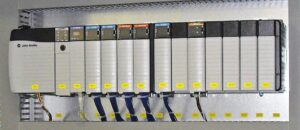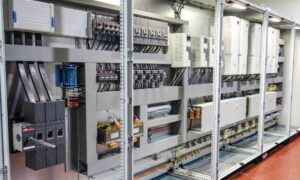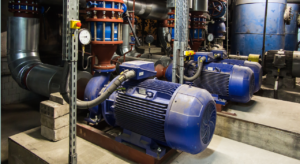Why 70% of Automation Projects Fail – PowerGear X’s 7-Step Success Framework
Discover why most industrial automation projects fail and learn PowerGear X’s proven 7-step framework to avoid costly mistakes and ensure success.
Discover why most industrial automation projects fail and learn PowerGear X’s proven 7-step framework to avoid costly mistakes and ensure success.
The industrial automation landscape is evolving rapidly, driven by advancements in AI, IoT, and sustainable practices. For engineers and decision-makers in control systems, staying updated on emerging trends is critical to maintaining competitiveness. Here are the top 7 industrial automation trends for 2025 that will redefine industrial control modules:

AI algorithms will dominate automation control modules, enabling real-time anomaly detection and predictive maintenance. Systems will self-optimize, reducing downtime by up to 30% and extending equipment lifespan.
Decentralized processing via edge computing minimizes latency for mission-critical operations. Expect control modules to prioritize local data analysis, ensuring faster response times in IIoT environments.

Digital twins will become standard for simulating control module performance. Manufacturers can test upgrades virtually, cutting deployment risks and costs by 25%.
With rising connectivity, embedded security protocols in control modules (e.g., zero-trust architectures) will protect against sophisticated cyber threats.
Energy-efficient control modules powered by renewable energy algorithms will align with global net-zero goals, reducing carbon footprints without sacrificing productivity.

Ultra-reliable 5G networks will support wireless control modules, enabling flexible factory layouts and remote system adjustments.
Advanced HMIs (Human-Machine Interfaces) with voice/gesture controls will simplify interactions, boosting operator efficiency in complex environments.
Why This Matters for Your Business
Adopting these trends ensures your automation systems remain agile, secure, and cost-effective. Start by auditing legacy control modules, piloting AI-driven tools, and partnering with vendors offering future-proof solutions.
Final Thoughts
2025 will prioritize smarter, greener, and interconnected automation systems. By embracing these trends early, industrial players can unlock productivity gains and long-term resilience.
Explore the evolving landscape of converged communication networks. Discover key design considerations, technological advancements, and the impact on industrial automation.
Explore the Bently Nevada 330101 3300 XL 8 mm Proximity Probe. Learn its uses, principles, and applications. Enhance your industrial automation knowledge today.
China’s industrial outlook is optimistic, with continued technological integration and increased demand for automation engineers. Opportunities in robotics, AI, and smart manufacturing are expanding as the industry evolves. Professionals must stay updated with the latest trends and continuously enhance their skills to remain competitive.

China Industry heavily invests in technological progress, particularly in industrial automation. The adoption of robotics and AI significantly boosts production efficiency. Widespread digitalization enhances product quality and reduces costs, making it essential for automation engineers to continuously learn and adopt new technologies to provide efficient solutions.
Despite the prevailing optimism, there is intense competition and a constant need for innovation in China’s manufacturing sector. Automation engineers must address these challenges by driving innovation and remaining competitive. Solving complex problems and collaborating across various fields are crucial for fostering industrial progress.

China’s robust infrastructure and favorable government policies significantly support industrial development. Efficient logistics systems attract investment and drive innovation. It is essential for automation engineers to understand these policies deeply, as they play a critical role in optimizing systems and promoting upgrades within the industry.
Global industry leaders express rising confidence in China’s manufacturing sector, driven by its strong industrial base and significant growth potential. China’s pivotal role in the global supply chain attracts substantial investment, while the large market and consumer demand present vast opportunities. Automation engineers need to grasp these dynamics to effectively provide technical support and solutions.

Check below popular items for more information in PowergearX Technology.
| Model | Title | Link |
|---|---|---|
| 22D-D010F104 | Allen-Bradley AC Drive PowerFlex 40P | Learn More |
| 22D-D010H204 | Allen-Bradley AC Drive PowerFlex 40P | Learn More |
| 22D-D012F104 | Allen-Bradley AC Drive PowerFlex 40P | Learn More |
| 22D-D012H204 | Allen-Bradley AC Drive 5.5 kW / 7.5 HP | Learn More |
| 22D-D012N104 | Allen-Bradley AC Drive PowerFlex 40P 480V AC | Learn More |
| 22D-D017F104 | Allen-Bradley AC Drive PowerFlex 40P | Learn More |
| 22D-D017H204 | Allen-Bradley AC Drive PowerFlex 40P | Learn More |
| 22D-D017N104 | Allen-Bradley AC Drive PowerFlex 40P | Learn More |
Explore how to modernize existing manufacturing operations using smart technologies. Learn about key strategies and technologies for successful integration.
Explore the Bently Nevada 21000 Proximity Probe Housing Assemblies, their working principles, applications, advantages, and more. This guide provides a detailed overview for industrial automation professionals.
Allen Bradley‘s ControlLogix 5580/5570 handle complex factory automation with motion, safety, and process control. Integrated Ethernet and GuardLogix safety variants enhance flexibility. ABB‘s AC500 matches this with modular scalability, four Ethernet ports, and built-in safety PLC connectivity. Both excel in mining, oil/gas, and high-speed manufacturing but prioritize different interfaces and expansion methods.

Allen Bradley‘s ControlLogix 5580/5570 handle complex factory automation with motion, safety, and process control. Integrated Ethernet and GuardLogix safety variants enhance flexibility. ABB‘s AC500 matches this with modular scalability, four Ethernet ports, and built-in safety PLC connectivity. Both excel in mining, oil/gas, and high-speed manufacturing but prioritize different interfaces and expansion methods.

Allen Bradley‘s CompactLogix 5480 supports IIoT via Windows OS, while the 5370 focuses on simplified commissioning. ABB’s AC500eco offers modularity for small systems, enabling SD card programming without software. Allen Bradley separates safety (GuardLogix 5380) and process models, whereas ABB integrates safety via modular expansions.
Allen Bradley embeds safety into ControlLogix/CompactLogix via GuardLogix branding. ABB uses dedicated safety CPUs (AC500-S) certified for SIL3/PL e, ideal for heavy machinery. For extreme environments, ABB’s AC500-XC withstands vibration, dust, and -40°C to 70°C without enclosures. Allen Bradley’s ArmorLogix provides ruggedness within existing size categories.
ABB’s PLCs prioritize modular expansion (I/O, comms, power) across all sizes. Allen Bradley segments systems by scale: ControlLogix (large), CompactLogix (mid), MicroLogix (small). ABB’s unified architecture simplifies customization, while Allen Bradley optimizes protocols (EtherNet/IP, DeviceNet) per product tier.

ABB PLCs standardize on Ethernet/IP and RS485/232, enabling FTP/FTPS access. Allen Bradley diversifies protocols: ControlLogix supports SynchLink, DH+, and DeviceNet. ABB’s SD card programming suits field updates; Allen Bradley uses Studio 500 software for centralized configuration.
Introduction to CompactLogix and ControlLogix Processors
Allen-Bradley’s CompactLogix and ControlLogix processors are key players in industrial automation systems. While both offer robust control solutions, they cater to different applications based on system complexity and size. Let’s explore their unique features to better understand which suits your needs.

CompactLogix processors are known for their versatility and cost-efficiency. Available in modular and all-in-one formats, they are well-suited for small to medium applications. Popular models include the L23, L30ER, and L35X. These controllers are designed to be ready for immediate use, with features like a built-in SD card slot, USB port, and embedded supercapacitor.
The ControlLogix series, originally released in 1999, is designed for larger, more intricate systems. These modular controllers provide expanded scalability with a power supply, processor, chassis, and communication modules. As the platform has evolved, newer models like the 5580 series offer significantly faster processing and enhanced communication capabilities, making them ideal for high-performance applications.

Memory capacity is one of the most notable differences between these two families. The ControlLogix 5580 boasts up to 20 MB of user memory, while the CompactLogix 5380 reaches a maximum of 10 MB. Both processors offer enhanced communication options, including high-speed Ethernet and USB ports, but the ControlLogix 5580 provides up to 1 Gbps Ethernet, significantly improving communication speed.
The latest CompactLogix 5380 and ControlLogix 5580 models offer substantial upgrades in performance. The CompactLogix 5380 comes with a 1 Gbps Ethernet port and improved memory, while the ControlLogix 5580 outperforms earlier models with its increased speed and memory capacity. The ControlLogix 5580 offers an impressive 20 times faster program scanning compared to previous versions.

| Feature | ControlLogix 5580 | ControlLogix 5570 | CompactLogix 5380 | CompactLogix 5370 L3 |
|---|---|---|---|---|
| Controller Tasks | 32/1000 programs/task | 32/1000 programs/task | 32/1000 programs/task | 32/1000 programs/task |
| User Memory | 3 MB to 20 MB + 6 MB safety | 2 MB to 8 MB + 4 MB safety | 0.6 MB to 10 MB + 5 MB safety | 1 MB to 5 MB + 1.5 MB safety |
| Built-in Ports | Single-port Ethernet (1 Gbps) | Dual-port Ethernet (100 Mbps) | 2 Ethernet ports (1 Gbps) | Dual-port Ethernet (100 Mbps) |
| Communication Options | EtherNet/IP, ControlNet™, DeviceNet™, USB | EtherNet/IP, ControlNet™, DeviceNet™, USB | EtherNet/IP, USB | EtherNet/IP, USB |
| Controller Connections | Not Applicable | 500 Connections | Not Applicable | 256 Connections |
When selecting between CompactLogix and ControlLogix, consider your system’s size and complexity. For smaller systems with moderate I/O, CompactLogix offers a cost-effective, reliable option. On the other hand, for large-scale, high-performance applications, ControlLogix provides more robust capabilities and scalability.
Explore the Bently Nevada PROXPAC XL Proximity Transducer Assembly’s working principles, key functions, advanced features, and industrial applications for precision machinery monitoring.